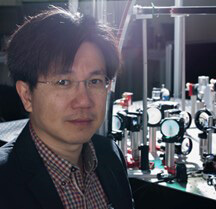COLLOQUIUM 2022
Using Deep Learning Artificial Neural Networks for Optimisations of Optical Alignment and Magneto-Optical Trap
| Speaker | Prof Lam Ping Koy, Australian National University and Chief Quantum Scientist, A*STAR |
| Host | Manas Mukherjee |
| Date/Time | Wednesday, 19 October 2022, 15:00 PM |
| Location | Lecture Theatre 28 (LT 28) |
Abstract
Many important physical processes have dynamics that are too complex to completely model analytically. Optimisation of such processes sometimes relies on intuition, trial-and-error, or the construction of empirical models. Machine learning based on artificial neural networks has emerged as an efficient means to develop empirical models of complex systems. In this talk, we will present the adoption of a deep learning artificial neural network to aid in our experimental optimisations. As examples, we chose to optimise the alignment of optical resonators and the optical density of a magneto-optic trap of neutral Rb atomic ensemble.
As optical scientists we often spend a lot of time aligning lasers to a resonator or an interferometer even only to achieve high coupling and interferometric visibility of the simple TEM00 beams. Using an artificial neural network, we show that automation of optical alignment can be easily performed with high mode-matching efficiencies.
When the optical density of an atomic ensemble is high, many-body interactions start to give rise to complex dynamics that preclude precise analytic optimisation of the cooling and trapping process. The solution identified by our artificial neural networks produces higher optical densities and is radically different to the smoothly varying adiabatic solutions commonly used. Machine learning may provide a pathway to a new understanding of the dynamics of the cooling and trapping processes in cold atomic ensembles.

Biography
Prof Lam Ping Koy is an Australian National University professor who recently join A*STAR as the chief quantum scientist. His research interests are in quantum optics, optical metrology, opto-mechanics, and quantum information. He has held visiting positions at Erlangen-Nürnberg Universität (2000), Paris University (2007) and Tianjin University (2013-2015) and Nanyang Technological University (2020-2022). Ping Koy was awarded the British Council Eureka Prize for inspiring science with his research and outreach activities (2003), and the University of New South Wales Eureka Prize for innovative research for his work in quantum communication (2006). In 2006, He co-founded QuintessenceLabs, the first Australian company to commercialize quantum communication technology. In 2014, He was awarded the Australian Institute of Physics Alan Walsh Medal for significant contribution to Australian Industry. He was made a Laureate Fellow of the Australian Research Council in 2015 and in 2020 he was elected as a Fellow of the Australian Academy of Science.
